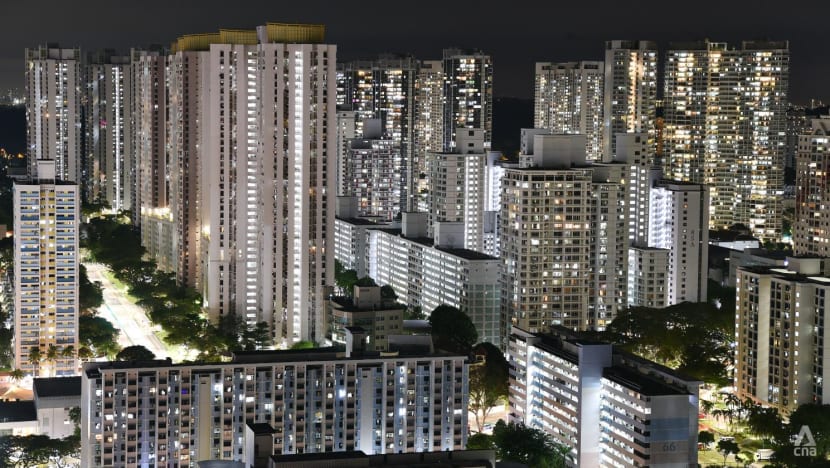PacificLight Power to build hydrogen-ready gas power plant in Singapore

HDB flats in Toa Payoh at night. (File photo: CNA/Jeremy Long)
SINGAPORE: PacificLight Power (PLP) said on Friday (Jan 3) that it has received approval from the Singapore government to build a new hydrogen-fuelled gas power plant on Jurong Island.
The project forms part of Singapore's plans to decarbonise its power grid, which relies mostly on natural gas to generate power.
With approval from Singapore's Energy Market Authority (EMA), PLP will build, own and operate a hydrogen-ready combined cycle gas turbine (CCGT) facility to supply at least 600 megawatts (MW) of power from January 2029, the firm said in a statement.
The country currently houses one CCGT facility owned by PLP, which has been operating since 2014 with a capacity of 830 MW.
The new facility, to be built on a greenfield site, will be able to use at least 30 per cent hydrogen at inception and 100 per cent hydrogen in the future, and will also include a large-scale Battery Energy Storage System (BESS), the company said.
The site can accommodate a second CCGT unit and could integrate carbon capture, utilisation and storage (CCUS) technology in future, it added.
PLP is also constructing a Fast Start power generating unit to provide 100MW of power by the second quarter of 2025. Such units can ramp up power output in a short period to ensure continued power supply when unexpected events occur.
"We are honoured that EMA has selected PacificLight to deliver two critical projects: the 100MW Fast Start Project in April 2024 and now the right to develop a new power plant," said PacificLight CEO Yu Tat Ming.
"By integrating hydrogen-ready and battery storage technologies, the new facility will position PacificLight to transition to a low-carbon future. We are committed to delivering the new plant safely and on schedule”.
Together with Indonesia's Medco Power Global and Singapore-based investment firm Gallant Venture, PLP is also developing a project to import 600MW of solar power from Indonesia's Bulan Island to Singapore.
PLP is owned by shareholders under Hong Kong-based First Pacific Group and the Philippines' power distribution firm Meralco PowerGen Corp.
RISING ELECTRICITY DEMAND
Singapore's electricity demand has been rising steadily over the years, fuelled by electricity-intensive industries such as advanced manufacturing, the digital economy and electrification of the transport sector, EMA said in a media release on Friday.
About 95 per cent of Singapore’s electricity is currently generated using imported natural gas. However, it needs to go greener to meet its national climate target of achieving net-zero emissions by 2050.
Singapore is expected to have at least nine hydrogen-compatible power plants by 2030. The Ministry of Trade and Industry (MTI) previously said that hydrogen could supply up to half of Singapore's needs by 2050.
In 2022, Keppel Infrastructure announced it would develop Singapore’s first hydrogen-ready power plant, expected to be ready in 2026.
YTL PowerSeraya last year won the right to develop, own and operate a new hydrogen turbine earlier, which is expected to be completed by 2027.
EMA said that additional power generation capacity will be required in 2029 to meet the projected growth in electricity demand and ensure the power system’s reliability.
"With rising energy demand, it is imperative to ensure adequate generation to power our daily lives. We look forward to the new hydrogen-ready generation capacity from PacificLight Power," said EMA chief executive Puah Kok Keong.
"EMA will continue to work with the industry to ensure the reliability and security of the power system, as we transition towards a low-carbon energy future."
In July 2023, EMA established the Centralised Process for facilitating and guiding private investments in new generation capacity.
Under this process, EMA will forecast electricity demand and available generation capacity on a rolling 10-year basis and, if projections indicate insufficient generation capacity, EMA will launch proposals to invite the private sector to build, own and operate the new generation capacity required.
PLP was selected from a total of six proposals submitted to develop the hydrogen-ready CCGT generating unit.















